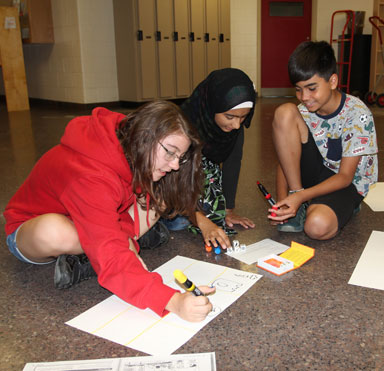DDSB Students Close Gaps and Get Ahead with SMILE STEAM Program
Durham Continuing Education pilots Summer Meaningful Innovative Learning Experience (SMILE)
By Sarah Racioppa
From coding and creating a pedometer, to using a green screen and 3D printer, students in the SMILE program are getting a taste of everything.
“This program is all based on STEAM, so students participate in activities involving Science, Technology, Engineering, Arts and Math,” says Lindsey Palmer. Palmer, along with two other teachers, Sarah Gilbride and Courtney Rodgers, developed the program.
The idea was to revamp Durham Continuing Education (DCE)’s summer literacy and numeracy program. Instead of having a half day of literacy and a half day of numeracy, this program incorporates both in lessons throughout a full day. Located at G.L. Roberts CVI, SMILE is open to any students who have completed Grade 6, 7, or 8.
“The whole program revolves around the idea of water, the water crises around the world, and human rights,” explains Palmer. Along with daily interactive games and lessons, for the duration of the program (July 3 to July 27) students worked towards what Palmer and the other teachers call their “Parent and Community Involvement Symposium.” Students chose a global community to focus on and created a news broadcast with a green screen, a 3D model of a solution to the water crisis produced on a 3D printer, and designed and programmed a Google site to explain their chosen community. On the final day of class parents/guardians came to watch the students present their research.
“Me and Shan chose Cape Town, South Africa because they are having a water crisis right now,” explains Ashley, a student in the program. “We made a 3D model that will filter the water. If it’s raining too much the filter will cover it so no more water gets in. If you want water, there’s a button on the side you can press that brings the water out.”
Some of the exciting activities the students participated in were: Creating a compass to map out an area of the school, creating a pedometer to measure water during their water walk, a literacy-based Amazing Race game, and many more fun and interactive lessons.
Leveraging digital is a key component of the SMILE program. Various technologies and programs used included: Chromebooks to create Google sites, Micro Bits to code, and Tinkercad to create and print the original 3D models.
Teacher Courtney Rodgers offered her opinion on why STEAM-based learning is so important for young students, “To have an interest early on is important. It’s going to be where most of the jobs are in the future.”
Rodgers, Palmer, Gilbride, and the whole DCE team hope they can bring SMILE back next summer, this time with a focus on space exploration.




